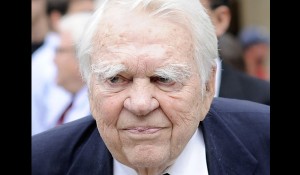Beloved curmudgeon Rooney bids TV farewell
WASHINGTON – Andy Rooney, the most beloved curmudgeon in US broadcasting, had the last word for the last time on “60 Minutes” on Sunday, foregoing his signature crankiness for a spot of sentimentality.
“I’ve done a lot of complaining here, but of all the things I’ve complained about, I can’t complain about my life,” the 92-year-old Rooney said in his 1,097th and final closing essay for the CBS television news magazine program.
“All this time I’ve been paid to say what is on my mind on television. You don’t get any luckier in life than that,” he added, speaking as always from behind the walnut desk he built for himself in his New York office.
“This is a moment I have dreaded,” the veteran broadcaster concluded. “I wish I could do this forever. I can’t though. But I’m not retiring. Writers don’t retire and I’ll always be a writer.”
A fixture of US television since the 1950s, four-time Emmy winner Rooney has delighted and annoyed in equal measure, using the final minutes of each “60 Minutes” program to rant on everything from politics to pennies.
Couching his typically 300-word musings in the first-person — “What I just don’t understand is,” he would often say — Rooney aimed his opinions at the American everyman.
“I consider myself to be an absolute dead-center average American,” he said in one recent essay in which he acknowledged his ignorance about the pop singer Lady Gaga, who is 67 years his junior.
His very first essay on “60 Minutes” challenged a national media obsession with July 4 highway fatalities, arguing that statistically, the Independence Day holiday was a relatively safe one.
Later essays tackled such unlikely subjects as cereal boxes, coffee cans, mixed nuts and one-cent coins: “The US Mint ought to stop making pennies… You can’t buy anything with a penny, and they’re a pain in the pocket.”
In a characteristic skewering of excessive bureaucracy, regulations and incompetence, Rooney said last year: “I was frisked by a guy who wouldn’t have known a bomb from a Band-Aid.”
On another occasion, he pleaded guilty to the serial crime of stealing bread rolls at restaurants to eat the next morning for breakfast.
“Rooney’s job on ’60 Minutes’ was to be himself and say whatever popped into his head,” wrote the filmmaker and critic Matt Zoller Seitz on the Slate news website. “He was good at it.”
A native of Albany, the state capital of New York, Rooney embraced journalism while serving in Europe with the US army in World War II, covering the first US air raid over Nazi Germany and the liberation of Buchenwald.
He joined CBS in 1949 as a writer, first for game-show hosts such as Arthur Godfrey, and then for its pioneering television news division where, in 1968, he joined “60 Minutes” as a founding staff member.
His passion for bringing the essay — a fixture of American literature — to the small screen began in 1964 when CBS broadcast his musings on doors. He soon went on to reflect on bridges, hotels, women and chairs.
While three of his Emmys were for essays, his first was for the script of a CBS special in 1968 on African-American history, at a moment when race relations in the United States were at breaking point.
Rooney quit CBS in anger in 1970 over a program he had written challenging the morality of the Vietnam war, but returned two years later to write, produce and narrate segments for “60 Minutes.”
Sometimes his tongue got the better of him: in 1989, when AIDS was gripping the gay community, he suggested that “homosexual unions” were, like cigarette smoking, a source of “self-induced” death.
CBS suspended him for three months in 1990 after he was quoted — wrongly, he insisted — in a gay magazine as saying that African-Americans had more children because they were less educated.
Rooney tested the limits of political correctness again in 2007 when he took note of the growing number of Latino players in America’s national game: “Today’s baseball stars are all guys named Rodriguez to me.”
A much-published author, Rooney — who much preferred his old Underwood typewriter to a computer — rued modern technology.
“I’m not interested in having my books on an electronic device,” he once said. “I want them in books.”
And he was never comfortable with the celebrity that came with his job: “The money’s good, but there isn’t much else to be said for it. Even the people on the street who try to be polite bug me.”
“There’s nobody like Andy and there never will be. He’ll hate hearing this, but he’s an American original,” said CBS News chairman and “60 Minutes” executive producer Jeff Fager in a statement.
